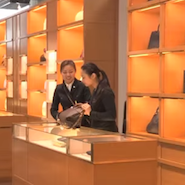- About
- Subscribe Now
- New York,
July 2, 2015

The luxury retail environment is undergoing critical changes, making it is essential for retailers to focus their attention on enhancing the in-store experience, according to a new report by Unity Marketing.
Affluent consumers increasingly prefer to shop online, and for traditional retailers to compete they will need to offer more specialized and personalized retail experiences. Furthermore, as affluents have been shown to have less interest in the accumulation of possessions, it is important for retailers to make stores more experiential and craft a rewarding experience for consumers.
“Luxury marketers are so focused on what they are selling that they often fail to look at what customers are buying,” said Pam Danziger, president of Unity Marketing, Stephens, PA. “In the case of the luxury consumers, they are buying experiences, and shopping is indeed an experience.
“Our new affluent consumer tracking survey examined the shopping behavior of affluents in 2015 and tracked trends from our shopper tracking study conducted in 2014," she said. "What we found was a distinct turn toward experiences, as measured in significantly greater spending on luxury experiences."
Unity Marketing's “Looking at luxury retailing through a new lens – the customers” examined the shopping behavior of 1,313 affluent consumers with an average income of $258,000 across four key sectors: general merchandise stores, Internet online retailers, specialty retailers and experiential marketers.
New era
In recent years there have been a number of significant changes in the habits of affluent consumers that have altered the retail landscape, forcing retailers to adapt. First, consumers have come to demand more from retailers.
A second significant change is the generational shift as baby boomers move into retirement and millennials begin to reach adulthood. Boomers are downsizing and spending less, while millennials have yet to fully achieve their earning potential.
Retailers must adapt to the new preferences of both generations and target their marketing strategies accordingly. Some new preferences can easily be determined.
For example, affluent consumers overwhelmingly reported shopping online instead of in-store when given the choice. To bring more consumers in-store, retailers must focus on creating experiential retail locations and highlighting customer service.
According to Unity Marketing’s study, certain retail experiences were more popular than others. For example, spending increased at retailers such as home specialty stores, personal care and beauty boutiques, liquor and wine shops and art galleries.
On the other hand, some retailers experienced declining sales, particularly luxury branded boutiques, jewelry stores and major appliance stores.
Diversity
While many studies have shown affluent consumers prefer to shop online, there are still some individuals who enjoy the in-store experience.
Despite the rise in digital and mobile marketing in recent years, consumers still rely heavily on in-store sales associates to assist them in making purchases, according to a report by the Luxury Institute.
The majority of consumers surveyed reported making most of their purchasing decisions in-store without researching online beforehand. Luxury brands looking to improve consumer relations should focus more attention on improving the in-store retail experience and providing consumers with ready assistance (see story).
Ultimately, retailers will be most successful when they diversify the retail experience and cater to a large number of consumers.
Retailers must adapt to changing consumer preferences by adopting real-time retail strategies that deliver a more personalized shopping experience, according to a special report by Boston Retail Partners.
Real-time strategies that use the latest technology to target the consumer and appeal to her unique taste will help retailers be more successful. Ultimately, the goal of these real-time strategies should be to establish an enjoyable multichannel experience for consumers accustomed to online and mobile environments (see story).
Understanding new consumer preferences and altering the retail experience to accommodate these changes can help any brand improve its sales and connect more with its consumers.
“In our report, we examine the affluent customers shopping experience from their vantage point," Ms. Danziger said. "We have identified qualities that retailers that deliver extraordinary experiences share, and in our report we show retailers how to create these experiences in their store.”
Final Take
Kay Sorin, editorial assistant on Luxury Daily, New York
Share your thoughts. Click here